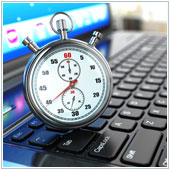 Keeping your computer running at its maximum performance is vital if you want to be able to complete your tasks quickly and easily. Having a slow PC can gravely affect your productivity, to the point that you become frustrated and work grinds to a halt. If you feel that your PC is running slower than usual, there are certain things that you can do to fix this. With a faster PC you can avoid delays and boost your productivity.
Keeping your computer running at its maximum performance is vital if you want to be able to complete your tasks quickly and easily. Having a slow PC can gravely affect your productivity, to the point that you become frustrated and work grinds to a halt. If you feel that your PC is running slower than usual, there are certain things that you can do to fix this. With a faster PC you can avoid delays and boost your productivity.
While there are several ways to go about improving your computer’s speed, these five methods are some of the best:
Computers come with pre-installed programs that you may not really need. They use system resources like memory and often run in the background when you start up your PC. Freeing up system resources can give you more space, thus improving your computer’s speed. Here’s how to do it.
Be careful not to remove applications that may be crucial for your PC to run properly. If you’re not sure about a certain program, research it to determine if it’s needed by the system or consult a technician.
The disk defragmenter is a tool that is a standard feature of all versions of Windows. It removes the bad sectors on your hard drive and optimizes file saving. It’s best not to do anything on your computer while running disk defragmenter to avoid interrupting the process. Furthermore, it usually takes time to complete so you may want to do this when you’re off work.
Uninstalling unwanted applications can free up space and improve performance. However, if you need to use several programs and you work on lots of files that must be stored on your device, your hard drive can get full in no time. It’s recommended to have at least 15% of your total hard drive space free for the system to run smoothly.
If over 85% of your hard drive space has already been used, you’ll start experiencing slowness on your computer. To fix this problem, you may need to purchase a hard drive with more storage capacity. With this, you can store more files and applications without experiencing slowness due to an almost full disk.
Another cause of slowness is low memory. Computers use RAM or random access memory to temporarily store data that you’re currently working on. Accessing multiple applications without enough memory will slow down your PC. To check if your memory is running slow, follow the steps below:
Virus infections can also cause a computer to slow down. If you have enough space on your hard drive and sufficient RAM, but are still experiencing sluggish performance, run a virus scan on your system as it could be infected. It’s recommended to keep your computer protected to prevent not just slowness, but other problems that can be caused by a virus, like corrupted files and system freezing.
Don’t let a slow computer disrupt your work, if you are looking for an effective solution contact us today to see how we can help.